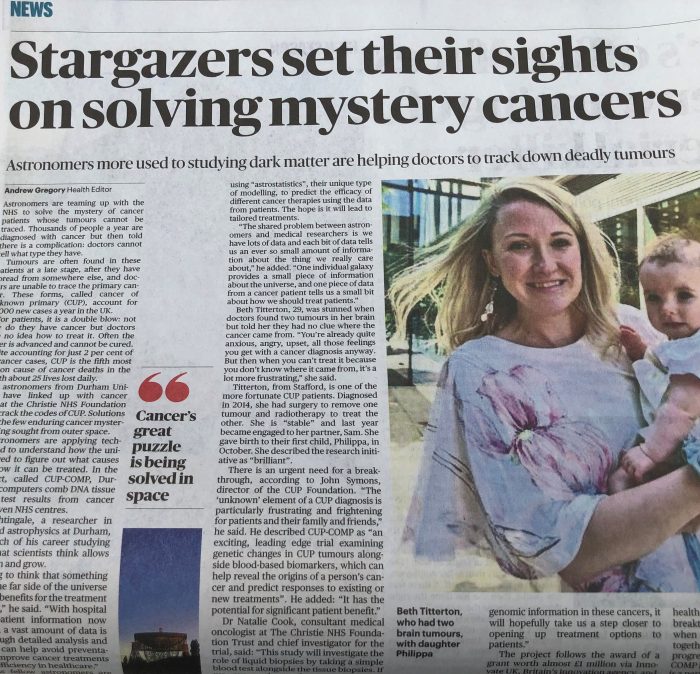The Sunday Times of 6 June 2021 carried a piece about the CUP-COMP trial.

The article is based on Roche’s press release:
The Christie NHS Foundation, astronomers from Durham University, Roche UK and biotech company ConcR are working together to advance the diagnosis and treatment of cancer of unknown primary (CUP) after being awarded a government grant of almost £1million, via Innovate UK. The 18 month grant will fund the CUP-COMP study, which is aiming to establish a mechanism to assess and compare the impact of genomic sequencing approaches (in tissue and blood) in patients with CUP at seven NHS sites across the UK.
CUP is a common cancer with a poor prognosis, affecting almost 9,000 people in the UK every year and accounting for approximately 2% of all new cancer cases. Every day, approximately 24 people are diagnosed with and 26 people die from CUP. It remains the 5th most common cause of cancer death, accounting for 6% of all cancer deaths. Despite significant advances and new drug development for other cancers, there are no approved immunotherapies and limited targeted therapies (only NTRK inhibitors) for CUP, and just one genomic biomarker currently funded, with limited progress due to the lack of research and funding.
Maureen Grant (69) from Liverpool, whose CUP has been treated at the Christie as part of a different clinical trial, said: “I found out I had cancer but didn’t know where and it was very distressing. I had so many tests and the prognosis wasn’t good. Although CUP isn’t curable, it is treatable and I’m very fortunate to already be on a clinical trial specifically for CUP patients. It’s offered hope when I thought all was lost for me. It’s fantastic to hear there is funding for more research into this type of cancer so more people who get the disease can benefit in the future.”
According to John Symons, Director of Cancer of Unknown Primary Foundation: “The ‘unknown’ element of a CUP diagnosis is particularly frustrating and frightening for patients and their family and friends. Patients understand that diagnosis is the key to effective treatment and the better the diagnosis, the better the chances of an effective therapy. CUP-COMP is an exciting, leading edge trial examining genetic changes in CUP tumours alongside blood-based biomarkers, which can help reveal the origins of a person’s cancer and predict responses to existing or new treatments. It has the potential for significant patient benefit.”
The collaboration brings in astronomers from Durham University who have been working with healthcare professionals to understand how statistical methods used to understand the evolution of the universe could support improvements in cancer treatment. The astronomers will help model the efficacy of cancer therapies across a range of datasets in the hope that the modelling can show how different therapies affect different cancers, enabling future prescribing to be tailored to individual patients.
Dr James Nightingale, Post-Doctoral Researcher in Astronomy and Astrophysics, Durham University, said: “With hospital records and patient information now stored digitally, a vast amount of data is available. Through detailed analysis and modelling, we can help avoid preventable diseases, improve cancer treatments and increase efficiency in healthcare. By exchanging knowledge with our colleagues in healthcare about the use of these huge datasets we can also better analyse images of galaxies to understand the evolution of the universe and the dark matter that scientists think allows galaxies to form and grow. It’s amazing to think that something happening at the far side of the universe could have real benefits for the treatment of cancer today.”
Dr Natalie Cook, Consultant Medical Oncologist at The Christie NHS Foundation Trust and Chief Investigator for the trial said: “CUP remains a significant cause of cancer death in the UK and there is still so much we need to understand about this type of cancer. It’s fantastic to have this substantial award from Innovate UK, and to work in collaboration with industry partners to run this multi-site, investigator-led study. Currently CUP patients aren’t able to access comprehensive genomic testing on the NHS and, even if they could, they have limited tissue available to test. This study will investigate the role of liquid biopsies by taking a simple blood test alongside the tissue biopsies. If we can understand more about the genomic information in these cancers it will hopefully take us a step closer to opening up treatment options to patients.”